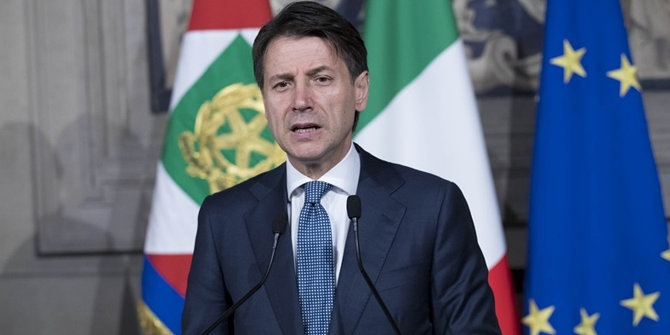 While finding out what the EU thinks of China is relatively easy for European academics, discovering what China thinks of the EU is a more cumbersome task. Li Zhang has scrutinised the country’s media coverage of the EU to find an answer. She writes that, at the micro level, China adjusts its views and expectations of the EU according to its own national interests, its changing identity and its evolving perceptions of the EU – a pattern she defines as ‘reflexive expectations’. At the macro level, China had high expectations on the EU’s role in a multi-polar world. These expectations have now shrunk in light of the financial crises and of the EU’s reluctance to implement a full financial partnership, and China now has more cautious and realistic expectations about EU-China cooperation.
While finding out what the EU thinks of China is relatively easy for European academics, discovering what China thinks of the EU is a more cumbersome task. Li Zhang has scrutinised the country’s media coverage of the EU to find an answer. She writes that, at the micro level, China adjusts its views and expectations of the EU according to its own national interests, its changing identity and its evolving perceptions of the EU – a pattern she defines as ‘reflexive expectations’. At the macro level, China had high expectations on the EU’s role in a multi-polar world. These expectations have now shrunk in light of the financial crises and of the EU’s reluctance to implement a full financial partnership, and China now has more cautious and realistic expectations about EU-China cooperation.
After three decades of fast development, EU-China relations have experienced a downturn since 2006. In 2011, however, the relationship started to warm up again, and in April 2014 China published its second EU policy paper. This policy paper defined China’s EU policy objectives in the new era, drawing a blueprint for China-EU cooperation in the 5 to 10 years to come.
Development of bilateral relations needs mutual understanding: knowing how each side views the other is of high significance. It is therefore significant that the EU has published six China policy papers and two country strategies since the mid-1990s. By examining these documents against the background of the EU’s relatively open politics, it is not too difficult to trace the evolution of Europe’s understanding of China’s development, as well as the EU’s strategy for its relations with China at the institutional level.
But we know little about the changes, if any, of China’s views, attitudes and expectations towards this partnership, towards European integration and towards the EU’s international role. China’s two EU policy papers, published in 2003 and 2014, are certainly not sufficient to provide the answer. Scattered speeches by high-level Chinese officials and China’s opaque policy-making process will not allow us to track continuity and change in thinking on a regular basis.
One way to overcome this difficulty is to scrutinise the country’s propaganda. A 26-year longitudinal analysis of China’s most authoritative daily newspaper, the People’s Daily, reveals that China’s relations with the EU should be characterised neither as a case of a ‘capability-expectations gap’ nor as an ‘expectation deficit’, which has been the case in the EU’s relations with many Asian nations. Instead, it indicates that China holds ‘reflexive expectations’ of the EU over time. China adjusts its views on the EU and its expectations according to its changing national interests, identity and perceptions of the EU’s capability.
Since the end of the Cold War, China has been expecting the EU to act as one of the poles in the multi-polar world order that China seeks. In the eyes of the Chinese government, both the external environment (the end of the Cold War), and the internal context (the European integration process), have provided good opportunities for the EU to increase its ability and presence as an international actor. This shapes the media frame of the EU in two main ways: the EU as a political actor and the EU as an economic and trade actor. The former is slightly more prominent than the latter.
The positive media discourse that accompanied the Maastricht Treaty, the Amsterdam Treaty and the EU enlargements portrayed the EU as a developing political union. It indicated that internal political integration would strengthen the EU’s opportunity and presence as an international political actor. From Bosnia-Herzegovina to Chechnya, from Kosovo to Palestine-Israel, from Iraq to Iran, from Libya to Syria, the EU has been highly visible in China’s news reporting, particularly when it took a different stand from that of the US.
However, expectations of actorness are not the same as the effectiveness of actorness. The EU may have been represented as an active player in international politics, but this does not necessarily imply that it is an effective player. After the EU’s failure to achieve consensus among member states on several international issues, China’s trust in the EU’s capability as an international player declined sharply.
From the economic perspective, the negative reporting of Europe’s financial troubles in the early 1990s took a positive turn with the creation of Europe’s single market, the European Economic Area (EEA) and particularly with the launch of the single currency.
The introduction of the euro was reported as a symbol of the success of European economic integration and, more importantly, it was highly expected by China to be of significance to the structure of the international finance system and to challenge the hegemony of the US dollar in international financial markets. But this expectation faded during the 2008-9 global financial crisis and the ensuing Eurozone sovereign debt crisis. On the other hand, newspaper coverage still shows China’s continuous confidence in the currency as well as in the EU’s ability to resolve the crisis.
The framing of the EU as China’s cooperative partner is prominent in the People’s Daily’s coverage and closely linked with the development of, and changes in, the relationship between China and the EU. The bilateral economic and trade relations as well as the joint projects are the two most covered subjects.
The fast improvement in the EU’s external relations with China between 1995 and 2003 nurtured the latter’s expectation of an EU-China ‘full partnership’ to be truly strategic. In this EU-China honeymoon period, China raised requests to lift the EU’s arms embargo against China and to grant it full market economic status. The EU’s decisions on the two requests are still pending.
China disappointedly realised that the bilateral relations have not been the same at a strategic level as they are on paper. In the meantime, the different tone of the EU toward China, reflected in the EU’s 2006 policy paper entitled ‘EU-China: Closer Partners, Growing Responsibilities’, further added to the disappointment.
The EU has been moved further down in China’s ranking as a strategic partner. China started to hold a more cautious and realistic expectation of this partnership, particularly with the changes in China and in the EU’s economic power after the financial crisis.
Combined with an analysis of China’s changing national interests and identity, this examination of the 26-year Chinese official media discourse on the EU and China-EU bilateral relations reveals the changes in China’s attitude and expectations of the EU that have occurred over this period. At the macro level, China’s expectations of the EU have never been low; on the contrary, it expected a united Europe to be a major force in a multi-polar system. At the micro level, China’s expectations of the EU’s actorness have been reflexively constructed. This ‘reflexive expectation’ is determined by the changing of China’s national interests and identity, as well as the development and changes in the EU and in EU-China bilateral relations.
For a longer discussion of this topic see the author’s recent article in the Journal of Common Market Studies
Please read our comments policy before commenting.
Note: This article gives the views of the author, and not the position of EUROPP – European Politics and Policy, nor of the London School of Economics.
Shortened URL for this post: http://bit.ly/1KQEUIg
_________________________________
 Li Zhang – University of East Anglia
Li Zhang – University of East Anglia
Li Zhang is Lecturer of International Media & Culture at the School of Politics, Philosophy, Language and Communication Studies of the University of East Anglia.






So as an bserver, what do you think China makes of Britains upcoming EU Referendum. Is it neutral, in favour or against. Do you think an índependent’ Britain would be able to strike better trade deals? Attract more Direct Foreign Investment, or will suspicions of the ‘Opium Wars’ era prevail?
Based on my observation, Britain’s leaving the EU would have a negative impact on both. The trade relations between China and the UK are current good. More good news may arrive during Chinese President Xi’s forthcoming UK visit.